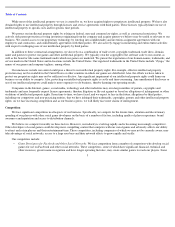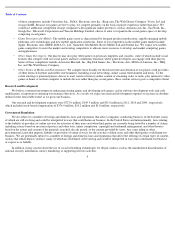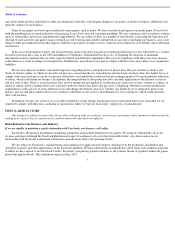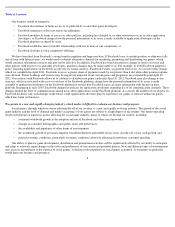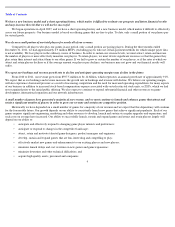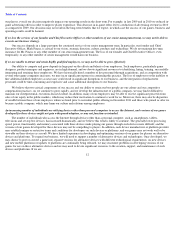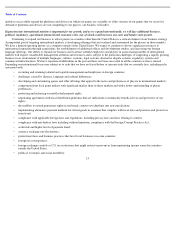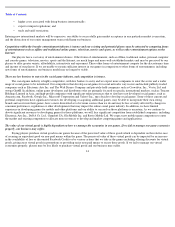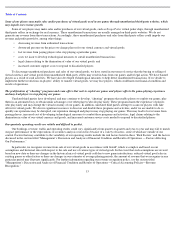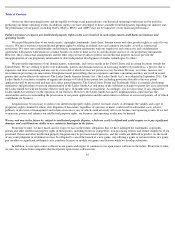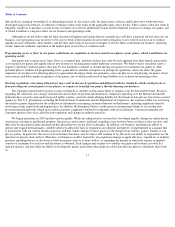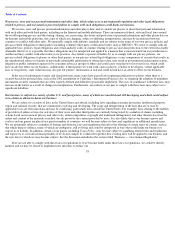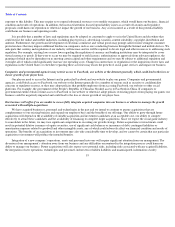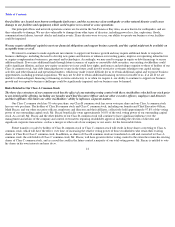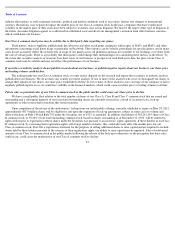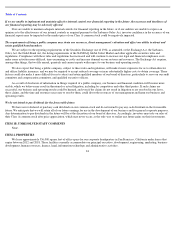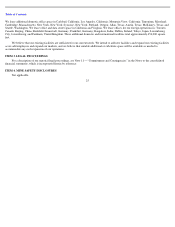Zynga 2011 Annual Report Download - page 19
Download and view the complete annual report
Please find page 19 of the 2011 Zynga annual report below. You can navigate through the pages in the report by either clicking on the pages listed below, or by using the keyword search tool below to find specific information within the annual report.
Table of Contents
Some of our players may make sales and/or purchases of virtual goods used in our games through unauthorized third
-party websites, which
may impede our revenue growth.
Some of our players may make sales and/or purchases of our virtual goods, such as Zynga Poker virtual poker chips, through unauthorized
third-party sellers in exchange for real currency. These unauthorized transactions are usually arranged on third-party websites. We do not
generate any revenue from these transactions. Accordingly, these unauthorized purchases and sales from third-party sellers could impede our
revenue and profit growth by, among other things:
To discourage unauthorized purchases and sales of our virtual goods, we have stated in our terms of service that the buying or selling of
virtual currency and virtual goods from unauthorized third-party sellers may result in bans from our games and/or legal action. We have banned
players as a result of such activities. We have also developed technological measures to help detect unauthorized transactions. If we decide to
implement further restrictions on players’ ability to transfer virtual goods, we may lose players, which could harm our financial condition and
results of operations.
The proliferation of “cheating” programs and scam offers that seek to exploit our games and players affects the game-playing experience
and may lead players to stop playing our games.
Unrelated third parties have developed, and may continue to develop, “cheating” programs that enable players to exploit our games, play
them in an automated way or obtain unfair advantages over other players who do play fairly. These programs harm the experience of players
who play fairly and may disrupt the virtual economy of our games. In addition, unrelated third parties attempt to scam our players with fake
offers for virtual goods. We devote significant resources to discover and disable these programs and activities, and if we are unable to do so
quickly our operations may be disrupted, our reputation damaged and players may stop playing our games. This may lead to lost revenue from
paying players, increased cost of developing technological measures to combat these programs and activities, legal claims relating to the
diminution in value of our virtual currency and goods, and increased customer service costs needed to respond to dissatisfied players.
Our quarterly operating results are volatile and difficult to predict.
Our bookings, revenue, traffic and operating results could vary significantly from quarter-to-quarter and year-to-
year and may fail to match
our past performance or the expectations of securities analysis or investors because of a variety of factors, some of which are outside of our
control. Factors that may contribute to the variability of our operating results include the risk factors listed in these “Risk Factors”
and the factors
discussed in the section titled “Management’s Discussion and Analysis of Financial Condition and Results of Operations — Factors Affecting
Our Performance.”
In particular, we recognize revenue from sale of our virtual goods in accordance with GAAP, which is complex and based on our
assumptions and historical data with respect to the sale and use of various types of virtual goods. In the event that such assumptions are revised
based on new data or there are changes in the historical mix of virtual goods sold due to new game introductions, reduced virtual good sales in
existing games or other factors or there are changes in our estimates of average playing periods, the amount of revenue that we recognize in any
particular period may fluctuate significantly. For further information regarding our revenue recognition policy, see the section titled
“Management’s Discussion and Analysis of Financial Condition and Results of Operations—Critical Accounting Policies—Revenue
Recognition.”
15
•
decreasing revenue from authorized transactions;
•
downward pressure on the prices we charge players for our virtual currency and virtual goods;
•
lost revenue from paying players who stop playing a particular game;
•
costs we incur to develop technological measures to curtail unauthorized transactions;
•
legal claims relating to the diminution of value of our virtual goods; and
•
increased customer support costs to respond to dissatisfied players.


